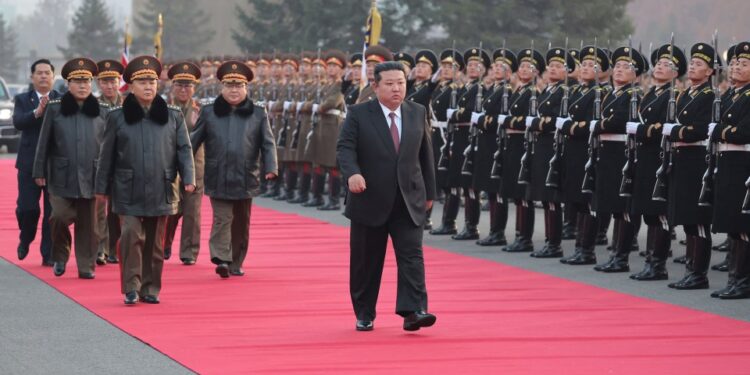KIM Jong-un is rubbing his hands together with glee at South Korea’s martial law crisis, an expert claims.
Michael Madden, the director and founder of North Korea Leadership Watch, said the turmoil was a “gift” for the tyrant.
Kim will now blast the chaos out to his citizens through the country’s propaganda network and claim his brutal rule is better than democracy.
Madden told The Sun: “What they do now is they say ‘Well this is a decadent, corrupt, capitalist culture… So why would you go there?’
“‘You might be hungry here but we have stability’.”
Madden said President Yoon Suk Yeol’s martial law declaration was “almost a gift” to Kim and North Korean public affairs propaganda.
The crisis’ effect was to make autocratic Pyongyang look more politically stable than Seoul, he said.
That could also affect any diplomacy between the archenemies, as Kim could claim the south is not trustworthy.
He said: “What the North Koreans can do now is point to the fact that they [South Korea] declared martial law, they can basically point to a high degree of dysfunction in South Korean political culture.
He added: “This is a bit of a maybe ‘found money’ for Kim Jong-un and North Korean elites because all they have to do is point: ‘This is a chaotic dysfunctional political environment so why the hell are we going to talk to them first of all’.”
Kim is yet to comment on the crisis in South Korea, with Wednesday’s edition of the state newspaper not mentioning what had happened.
But Kim could exploit it as the dictator has acted increasingly aggressively towards the West and has sent 10,000 troops to fight in Russia’s war with Ukraine.
He has also expanded his weapons arsenal, building exploding kamikaze drones and has ordered their mass production.
Seoul was plunged into chaos on Tuesday after President Yoon declared martial law in a surprise 11pm speech.
Yoon ordered soldiers to storm the National Assembly with elite special forces troops being flown by helicopter to the National Assembly.
Troops pushed their way through a crowd protesting Yoon’s decision outside the parliament and smashed windows and broke through doors to get past defences that had been built by civilians.
Officials built barricades at the parliament’s doors and sprayed the soldiers with fire extinguishers as lawmakers desperately pushed back against the alleged power grab.
Lawmakers then voted against the declaration 190-0 with the president’s party not voting.
Then, just six hours after declaring martial law, Yoon did a U-turn and cancelled his order in a humiliating climb down.
Lawmakers have now tabled an impeachment of Yoon which will need the support of two thirds of the parliament to pass.
South Korea’s defence minister has resigned after he was reportedly official to propose the move to Yoon.
Thousands of Koreans have taken to the streets around the country on Wednesday to continue protesting against the alleged power grab.
Lee Jae-myung – the leader of the opposition – has slammed the declaration Wednesday as “a coup against the people” and said the ruling party might try again.
He has hosted a massive rally outside the National Assembly saying the “great Korean people [had] overcome this coup”.
What is martial law?
MARTIAL law is the temporary replacement of a civilian government with military rule – typically during war or major disasters.
Historically, it has been brought in after coups, during protests, to suppress political dissent or stabilise insurrections.
It involves the military taking control of the normal legal system and control of civilians.
Ordinary laws and civil liberties may be suspended under martial law.
It is a drastic measure with significant implications for individual freedoms and the rule of law.
While it’s meant to be temporary, martial law can be indefinite.














